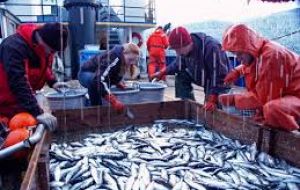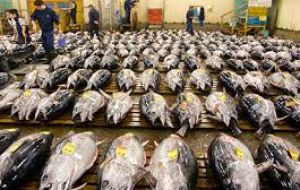MercoPress. South Atlantic News Agency
Researchers propose high seas fishing ban and concentrate on coastal catches
 The study examined global fish catch and landed value data to determine how much fish is caught in the high seas and how much is caught in coastal waters
The study examined global fish catch and landed value data to determine how much fish is caught in the high seas and how much is caught in coastal waters  Currently, ten high seas fishing nations capture 71% of the landed value of catches in international waters. (China, Japan, South Korea among others).
Currently, ten high seas fishing nations capture 71% of the landed value of catches in international waters. (China, Japan, South Korea among others).  ”We should use international waters as the world's fish bank,” says Rashid Sumaila, director of the UBC Fisheries Economics Research Unit
”We should use international waters as the world's fish bank,” says Rashid Sumaila, director of the UBC Fisheries Economics Research Unit Closing the high seas to commercial fishing could distribute fisheries income more equitably among the world's maritime nations, according to research from the University of British Columbia (UBC).
The analysis of fisheries data indicates that if increased spillover of fish stocks from protected international waters were to boost coastal catches by 18%, current global catches would be maintained. When the researchers modeled less conservative estimates of stock spillover, catches in coastal waters surpassed current global levels.
The study examined global fish catch and landed value data to determine how much fish is caught in the high seas and how much is caught in coastal waters (nations' 200-mile exclusive economic zones). The researchers then used models to compare likely increases in coastal catches driven by increased biomass spillover from protected areas and losses from the closure of high seas fisheries.
“We should use international waters as the world's fish bank,” says Rashid Sumaila, director of the UBC Fisheries Economics Research Unit and lead author of the study. “Restricting fisheries activities to coastal waters is economically and environmentally sensible, particularly as the industry faces diminishing returns.”
The findings appeared yesterday in Scientific Reports, published by Nature Publishing Group and will be presented today at the 2015 annual meeting of the American Association for the Advancement of Science (AAAS).
The study also indicates that a high-seas moratorium would improve fisheries income distribution among maritime nations. Currently, 10 high seas fishing nations capture 71% of the landed value of catches in international waters.
Under all scenarios considered by the researchers, European Member States, Group of Eight nations, and least developed fishing nations would benefit the most from a closure. Under a catch-neutral scenario, the United States, Guam and the United Kingdom would benefit the most, each with potential increases in landed values of more than USD 250 million per year. Canada would see an increase of USD 125 million annually.
While closing the high seas would benefit some countries, others stand to lose significant fisheries income. South Korea, Taiwan and Japan would each see a decrease in catch values of at least USD 800 million per year in a catch-neutral scenario. Countries that sail vessels under flags of convenience would also be hard hit. While this figure is not insignificant, Sumaila points out that the high seas belong to the world and currently only a few countries benefit from the fish resources. Countries fishing in the high seas will have to give something up to achieve higher levels of food security and profits globally.
The authors acknowledge that implementing a high seas ban would be a major undertaking, but argue that the ongoing expansion of human activities into the oceans may soon require major reform to the governance of international waters, while penalties imposed on illegal fishing could offset administrative and operational costs. (FIS).-




Top Comments
Disclaimer & comment rules-

-

-

Read all commentsAn interesting scenario. But there should be a little caveat. The only fishing vessels allowed into coastal waters should be those of the appropriate coastal state. An end, for instance, of spanish fishing vessels in UK coastal waters. Although some might be permitted if they pay for a suitably expensive licence. And all catches to be landed in the ports of the coastal state. What fun if a licence to fish in British Gibraltar Territorial Waters (BGTW) cost a spanish fisherman £10,000. And the catch having to be landed in Gibraltar. Should be fairly easy to police. Fishing vessel of spanish origin heading for spanish port? Intercepted and forced into Gibraltar's port. Oh, and a £10,000 fine and loss of licence for attempting to take a catch to a spanish port.
Feb 16th, 2015 - 01:08 pm 0Galician (spanish) fishing vessels going out of business. As it wouldn't be economic to pay for the necessary licences and get down to the South Atlantic. Who would trust taking a catch into an argie port?
Who would police it ?
Feb 16th, 2015 - 01:24 pm 0Do you think countries such as Taiwan would pay any attention to this ?
perhaps better education/and understanding of the consequences of over fishing,
Feb 16th, 2015 - 07:59 pm 0after all, the fish wont last for ever, and only the clever nations that act now, may well still be in business in the future,
fish farming may well come into its own,
after all, the greedy always end up with nothing,
just my opinion..
Commenting for this story is now closed.
If you have a Facebook account, become a fan and comment on our Facebook Page!